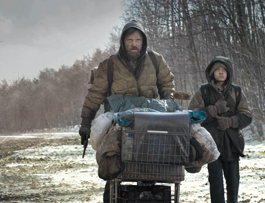home | metro santa cruz index | movies | current reviews | film review

BABY IT'S COLD OUTSIDE: Viggo Mortensen's Man and his Boy (Kodi Smit-McPhee)try to survive in the aftermath of a global disaster.
Roadburn
Cormac McCarthy's searing postcard from the end of the world comes to the screen
By Christina Waters
GRIPPED IN an eternal winter, the planet is growing colder. Sunlight struggles to pierce the leaden skies. The earth is dying and animals have long since vanished.
Welcome to the end of the world, a smoldering wasteland of dark beauty and danger. This bleak postapocalyptic vision is the work of director John Hillcoat, who closely shadows the Pulitzer Prize–winning novel by Cormac McCarthy. The Road glows with the heavy metal colors of a toxic landfill. Bronze, pewter and burnished gold are the faded hues of a world in which something fatal has taken place, though we're never told what. As in McCarthy's harrowing novel, much is left to the imagination—hence the film's ability to obliterate our most guarded defenses. The Road left me almost unable to breathe, so utterly sad is its full and final impact.
A few glimmers of tenderness pierce this ruined landscape. And almost all of them are due to the visceral work of Viggo Mortensen, identified only as The Man, a survivor determined to keep his son alive as the pair make their agonizing way south. Flashbacks to The Man's life with his wife (a luminescent Charlize Theron), how they existed through the unseen apocalypse, are almost unbearable in their painful reminder of how much humankind has lost. Mortensen, whose face seems to attract anguish, gives a performance that is as much courage as skill. If Edvard Munch had made a portrait of existentialist Søren Kierkegaard, the result might have been Mortensen's haunted beauty. Haggard, filthy, beyond pain, his character has been reduced to a state of raw survival. And yet for the sake of the child (eloquently played by Kodi Smit-McPhee) he refuses to relinquish "the fire," that kernel of decency and hope that he instills in his boy.
There are other survivors, roaming what's left of the country and towns, desperate for food and shelter. Many have formed feral gangs, cruising the nameless road for gasoline, spare truck parts and something to eat. The young boy is desirable prey, and the film unflinchingly documents the cannibalistic squalor of what's left of humankind.
The Road is a study in what we will do to survive, and how far we would go—what unthinkable acts of brutality we might commit—to save someone we love. Viggo's haunted face, stripped of every ounce of softness, reduced to sinew, rage and wildly protective love for his son, is the parallel road upon which the film travels. The Road envisions one way in which we might have to say goodbye: goodbye to the beauty of the earth, to laughter, to feeling safe and ultimately to being able to save our children. In the end, it is a parable about the road we all travel. One that may or may not lead to an unknown "somewhere."
This film is not for the timid. While it's ironic to actually recommend a film so filled with dystopian nightmare and profound sadness, to see it is to confront that collective fear of complete destruction we've all grown up with. To see death, decay and waste through this exquisite lens is to be almost liberated from mindless cultural denial.
Neither sunsets nor the homeless will ever look the same again.
![]() THE ROAD (R; 119 min.), directed by John Hillcoat, written by Joe Penhall, based on the novel by Cormac McCarthy, photographed by Javier Aquirresarobe and starring Viggo Mortensen and Charlize Theron, opens Friday at the Del Mar in Santa Cruz.
THE ROAD (R; 119 min.), directed by John Hillcoat, written by Joe Penhall, based on the novel by Cormac McCarthy, photographed by Javier Aquirresarobe and starring Viggo Mortensen and Charlize Theron, opens Friday at the Del Mar in Santa Cruz.
Send a letter to the editor about this story.
|
|
|
|
|
|